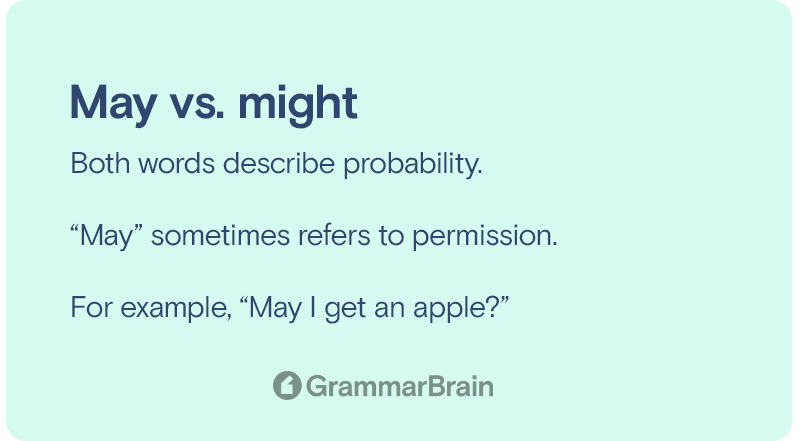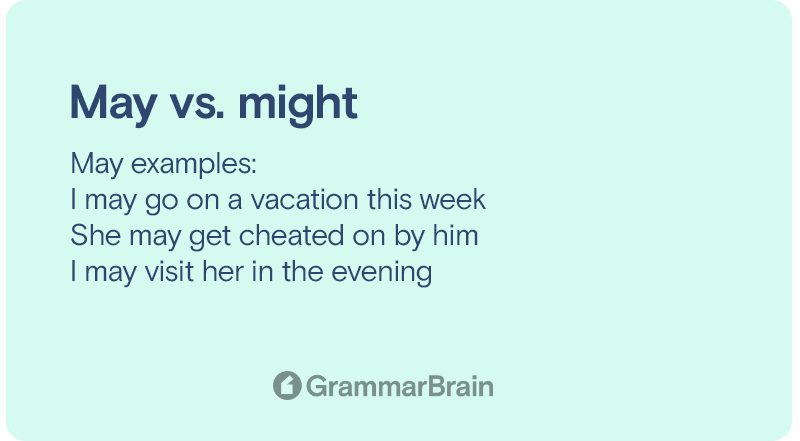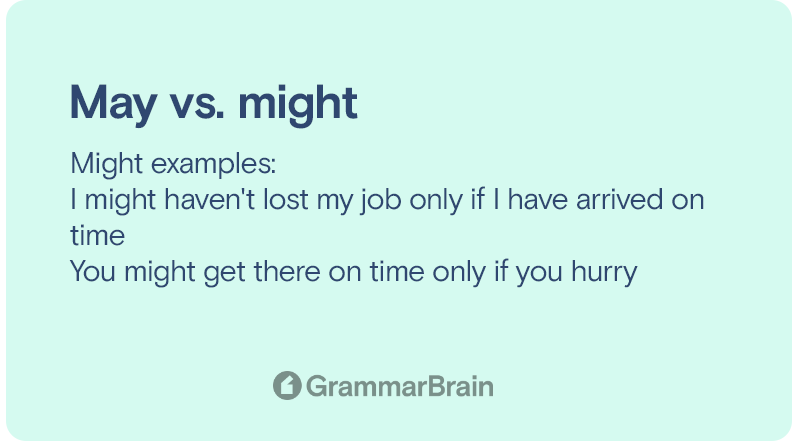What’s the difference between may vs might? The main difference between the words may and might is slight, but using the correct word can make your writing clear and comprehensible. It will take some time and practice before you can use these words accurately. Have patience for yourself and have fun learning the process.
Here are the key differences:
- The correct use of may is for only the present tense form. The past tense of may is might (to be precise, it is the past perfect tense of may).
- The word “may” typically expresses a high chance of something taking place, while ‘might’ indicates that it ‘might’ not take place(used in a negative hypothetical situation).
- Both the words may and might be used when you ask for someone’s permission, however, only use ‘may’ if you are giving permission to someone.
- Use the word may for expressing permission and possibility in the English language.
The slight difference between words is what causes confusion for those learning English and writing English.
In the guide below, we discuss the differences with proper definitions, examples with clear sentences, and a comprehensive proper English grammar explanation.

May vs Might: Definition and Examples of “May”
“May” is typically a modal auxiliary verb. It clarifies the principal verb of the sentence. If you are preceding a verb, the word ‘may’ means the possibility of something occurring, but it doesn’t guarantee the occurrence as a certainty.
For example, if you say, “I will go to school today,” the auxiliary verb here, “will,” suggests a certainty.
However, when you say, “I may go to the school today,” the auxiliary verb here, “may,” suggests there is a chance but no certainty. I hope the two sentences made it clear to you.
May is generally used for expressing possibility, real, or could be real.
For instance:
You can also use may to express permission.
For example:
- You may go to the game tonight.
- You may join the class.

May vs Might: Definition and Examples of “Might”
Similar to “may,” the word “might” is also a modal auxiliary verb. It clarifies the principal verb of the sentence.
However, the subtle difference is that “may” suggests more substantial certainty that the word ‘might.’
“Might” is undoubtedly a more decisive choice than the word “may” if you describe past hypothetical situations. It’s the word to use when highlighting possibility instead of permission. “May” is strongly associated with granting permission.
Both the words may and might clarify the main verb, but for granting permission, you only should use ‘may’, and for highlighting possibility, use ‘might.’
Might is generally used to express what is counterfactual, remotely possible, or hypothetical.
For instance:
- I might haven’t lost my job only if I have arrived on time.
- You might get there on time only if you hurry.

Main Difference Between The Words May vs Might
In informal writing and casual speech, you are more likely to get away with switching out the word may for might, and vice versa. Many writers use may and might interchangeably since they have similar meanings. But a professional writer will never make that mistake.
The past tense of may is might, and a professional writer (or someone writing an essay) should know when and where to use may and might.
If you want to use the grammatically correct word, here are three easy ways to remember —
- Tense (Present tense May and past tense might)
- Probability (For strong possibility, use might)
- Permission (For granting permission use may)
Ways to Use the Word ‘May’ in Sentences
Follow these 4 rules for putting “may” in sentences.
- “May” describes things that can occur. For instance, “I may go to the movies tonight”
- “May” describes present-tense hypothetical events. For instance, “Carry on like this, and you may get her in the end.”
- “May” expresses confidence in a negative hypothetical situation. For instance, “No matter what, I may not attend school today.”
- “May” expresses permission. For instance, “You may join the group.”
Ways to Use the Word ‘Might’ in Sentences
Whether copy editing or writing, use “might” in these 4 circumstances below.
- “Might” describes hypothetical situations with lower certainty. For instance, “I might know her better than you.”
- “Might” is the accurate word to express past hypothetical situations. For instance, “I might have crossed the line when I insisted on her.”
- “Might” clarifies a statement of chance instead of permission. For instance, “I just might cry tonight as my parents didn’t allow me to go to the tour.”
- “Might” expresses negative hypothetical situations that do not come with certainty. For instance, “I might not be able to join the group.”
Conclusion
The word “might” generally deals with cases that are hypothetical or didn’t happen, while may deals with cases that are likely to happen or could be real. So, keeping this in mind, you can use the words correctly.
FAQs
Can You Use May/Might Have Interchangeably?
Although some people use them interchangeably, that is not a good idea. Might express a lower probability, and you can never use might for granting permission.
In some cases, they can be interchangeable but not always.
Is it may or might have?
Both forms are correct. The only difference is that when you are referring to a present-tense situation, you can use ‘may have,’ and for a past tense, use ‘might have.’
Inside this article
Fact checked:
Content is rigorously reviewed by a team of qualified and experienced fact checkers. Fact checkers review articles for factual accuracy, relevance, and timeliness. Learn more.
Core lessons
Glossary
- Abstract Noun
- Accusative Case
- Anecdote
- Antonym
- Active Sentence
- Adverb
- Adjective
- Allegory
- Alliteration
- Adjective Clause
- Adjective Phrase
- Ampersand
- Anastrophe
- Adverbial Clause
- Appositive Phrase
- Clause
- Compound Adjective
- Complex Sentence
- Compound Words
- Compound Predicate
- Common Noun
- Comparative Adjective
- Comparative and Superlative
- Compound Noun
- Compound Subject
- Compound Sentence
- Copular Verb
- Collective Noun
- Colloquialism
- Conciseness
- Consonance
- Conditional
- Concrete Noun
- Conjunction
- Conjugation
- Conditional Sentence
- Comma Splice
- Correlative Conjunction
- Coordinating Conjunction
- Coordinate Adjective
- Cumulative Adjective
- Dative Case
- Determiner
- Declarative Sentence
- Declarative Statement
- Direct Object Pronoun
- Direct Object
- Diction
- Diphthong
- Dangling Modifier
- Demonstrative Pronoun
- Demonstrative Adjective
- Direct Characterization
- Definite Article
- Doublespeak
- False Dilemma Fallacy
- Future Perfect Progressive
- Future Simple
- Future Perfect Continuous
- Future Perfect
- First Conditional
- Irregular Adjective
- Irregular Verb
- Imperative Sentence
- Indefinite Article
- Intransitive Verb
- Introductory Phrase
- Indefinite Pronoun
- Indirect Characterization
- Interrogative Sentence
- Intensive Pronoun
- Inanimate Object
- Indefinite Tense
- Infinitive Phrase
- Interjection
- Intensifier
- Infinitive
- Indicative Mood
- Participle
- Parallelism
- Prepositional Phrase
- Past Simple Tense
- Past Continuous Tense
- Past Perfect Tense
- Past Progressive Tense
- Present Simple Tense
- Present Perfect Tense
- Personal Pronoun
- Personification
- Persuasive Writing
- Parallel Structure
- Phrasal Verb
- Predicate Adjective
- Predicate Nominative
- Phonetic Language
- Plural Noun
- Punctuation
- Punctuation Marks
- Preposition
- Preposition of Place
- Parts of Speech
- Possessive Adjective
- Possessive Determiner
- Possessive Case
- Possessive Noun
- Proper Adjective
- Proper Noun
- Present Participle
- Prefix
- Predicate



